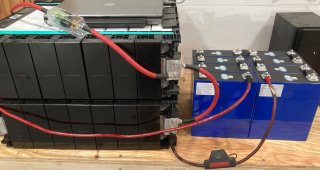The OP of this thread asked
Future of DIY LiFePO4 looks bleak…
I think the real threat to DIY in North America will not be the lowering costs and supposed better cells and build quality of OTS packs, it will be the ever evolving (an in some instances over burdensome) NEC and local community adoption and code requirements. I believe the latest 2020 NEC requires storage batteries to be UL listed (if not it soon will).
These increasing rules seem to have (at least as a bi product) the effect of diminishing DIY Solar and batteries packs builds making them illegal for home and other uses.
An example would be the 2017 NEC rapid shutdown requirement. Supposedly aimed at saving firefighters lives, but a major fire department official on the west coast completely disagreed.
My guess. Follow the money. Seems there are entities that do not want diy solar anything because it cuts into the bottom line. Do they pay off politicians and the NEC? Over my pay grade. But I wouldn't be surprised.
Just my .02 You're free to disagree
Happy to see all the renewed interest in the thread, but as the OP, perhaps it is time for me to chime in on what I intended.
First, the thread is about the future, not the present. Looking out 5 year from today, I suggested there will be a far smaller community of DIYers building their own battery packs as there are today.
And second, the thread was not intended to suggest DIY battery building will be dead. There will always be a niche community of hobbiests or those with specific requirements that cannot be met by mainstream offerings.
Lastly, the thread is not aimed at those interested to follow code. You cannot get a code-approved DIY Lithium ion battery today and you are unlikely to ever be able to do so. So that community needing UL-approved batteries off of a State-approved list are already buying OTS batteries by necessity and the future for that community looks quite bright since the only thing that will change going forward will be that prices will be getting much cheaper.
The intended audience for this thread, the community that I believe will shrink dramatically 5-10 years from now are those who have the freedom to use a DIY battery (no code/permit/inspection requirements) and whose primary motivation is achieving much lower storage cost in terms of $/kWh.
Cabiners/off-gridders & DIY-RVers are probably a good placeholder for the broad community I’m talking about.
Once it’s possible to purchase a close-to-equivalent OTS battery for a price primium of only 25-50% instead of 200-300% versus what can be built DIY, there will be far fewer RVers building their own LiFePO4 batteries (in my view).
So to recap:
Future for hobbiest/enthusiast DIY battery building looks bright;
Future for permitted/approved Solar+storage looks (very) bright
Future for the large community of DIYers who build batteries primarily because it is far, far more economical to do so is the the only community whose future looks bleak (meaning the size of that community is likely to have shrunk dramatically rather than grown once the $ premium for OTS offerings has dropped down to low double digits of % versus what you could build yourself.



